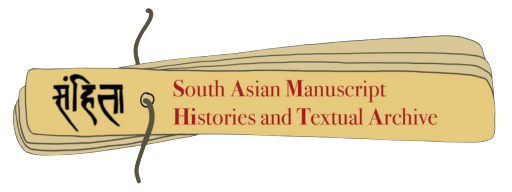Manuscripts
Search Filter
Praśnottararatnamālikā
112522_V069A_4243_CS Language : Sanskrit Scripts : Devanagari
A Vedānta text composed by Śaṃkaracārya, is the son of Śivaguru, pupil of Govindācārya, who was a student of Gauḍapāda. The text composed in an question and answer method. This text is also known by the name Praśnottararatnamālā.
Viṣṇupadīstuti
112524_V070A_4244_CS Language : Sanskrit Scripts : Devanagari
A stotra text, salutation to Goddess Gaṅgā, also kanown as Gaṅgātaraṅgāvalī. This text has different name of Goddess Gaṅgā. Though the name of the author is not clear because in the 4a folio mentioned, the text was composed by ' Śarman, called Bhāgavat'.
Bhāṣāpariccheda
112525_V071A_4245_CS Language : Sanskrit Scripts : Devanagari
A text on nyāya doctrine by Viśvanātha Nyāyapañcānana Bhaṭṭācārya (1637 CE), a Navyanyāya writer of Bengal. He was the son of Vidyānivāsa, who is son of bhavānanda Siddhāntavāgīśa. He was contemporary to King Shah Jahan. The text has 168 verses, however the last verse is incomplete, discusses on seven items as non-existence (padārtha) upto sound (śabda).
Ekākṣarakośa
112526_V072A_4246_CS Language : Sanskrit Scripts : Devanagari
A text on lexicography. This text addressed it self as kośa. This is a complete manuscript, explains various words (starts with svara and vyañjana) and their synonyms. It has words from a to kṣa. Although the name of the author is not specified, it is likely to be Puruṣottamadeva whose name is given as author in most manuscripts, NCC also mentioned it.
Paribhāṣāsūtrapāṭha and Pāṇinīyaśikṣā
112527_V073A_4247_CS Language : Sanskrit Scripts : Devanagari
The manuscript has two different text on Sanskrit grammar by Pāṇini. First text discussed on the technical technical terms of Sanskrit grammar. It contains the bare text of 132 Paribhāṣās and the second text on Sanskrit linguistics.
Saumyajāmātṛmunidinacaryā
112528_V074A_4248_CS Language : Sanskrit Scripts : Devanagari
A stotra text by Devarāja is of the Vādhūla gotra. According to NCC, he was the father of Raghupati and Śrīnivāsācārya. He was the disciple of Varadaguru or Varadarāja. The work is also called Pūrvadinacaryā or Varavaramunidinacaryā, and deals with the daily routine of Maṇavālamāmuni, founder of Tenkalai Śrīvaiṣṇva sect.
Uḍḍiśatantra
112544_V075A_4249_CS Language : Sanskrit Scripts : Devanagari
A text on Tantra, ascribed to Rāvaṇa, adversary of Rāma in the Rāmāyaṇa. This is a complete manuscriprt with an incomplete text. The text ends with Gaṇapatiprayoga, part of Uḍḍiśatantra. Manuscript has abbreviation as Uḍḍisa in every verso right side upper.
Lakṣmīstotra
112545_V076A_4250_CS Language : Sanskrit Scripts : Devanagari
A stotra text salutation to Goddess Lakṣmī by Vedāntadeśika also known as Veṅkaṭanātha, son of Ananta Sūri and Totārāmbā. He was born in Tūppul known also as Tiruattaṅkā or Himavana near Kāñcī. This is a vaiṣṇava stotra to God Śrīnivāsa of Tirupati.
Śūlinīmantra
112547_V077A_4251_CS Language : Sanskrit Scripts : Devanagari
The text concerns the mantras addressing Goddess Durgā in the form of Vaṭukabhairavī for removing diseases from the body.
Bhaumavratakathā
112549_V078A_4252_CS Language : Sanskrit Scripts : Devanagari
A vrata text describes the rituals which performed on the bhaumavāra (Tuesday) and their different auspecious activities. The text derives from the Bhaviṣyapurāṇa.
Gaṅgādaśaka
112550_V079A_4253_CS Language : Sanskrit Scripts : Devanagari
10 verses sotra text dedicated to Goddess Gaṅgā.
Durgāpūjāpaddhati
112551_V080A_4254_CS Language : Sanskrit Scripts : Devanagari
A Tantra text concerns paddhati of Durgāpūjā, detailing the eleven-fold nyāsa, up to the pātrāsādana (placing of the vessels). Part of a larger work. There appears to different material that continues on the last page. It speaks about impurity and talks about in how many situations impurity is not taken into considaration, such as the beginning of rituals prescribed for marriage (if death occurse), the rituals of sacrifice, a journy, a visit to a place of pilgrimage, etc. The last page mentions the occations when one must shave the head and when not.













